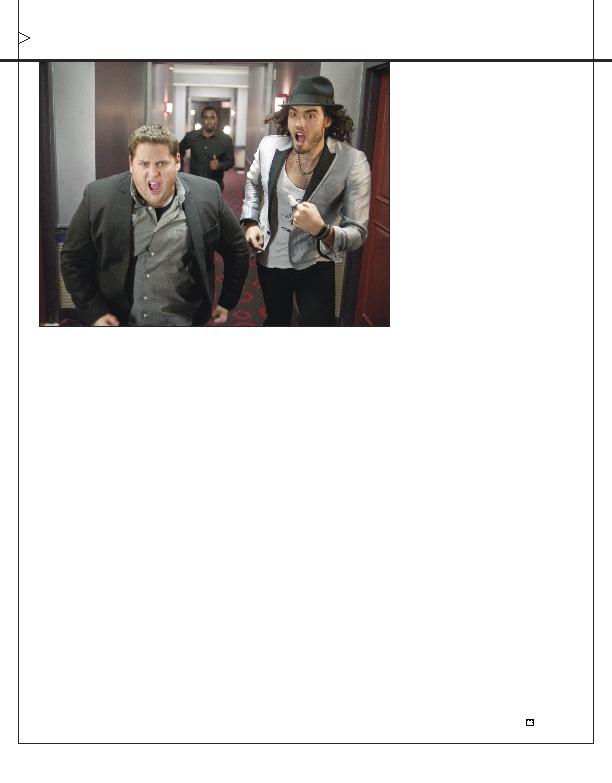
inkling of an idea for Get Him to the Greek. He
was at the first table read for Forgetting Sarah
Marshall and upon hearing Russell Brand and
Jonah Hill interact he knew he had some-
thing special. "That's a movie," Stoller re-
members thinking. "I don't know what kind
yet, but that's a movie!"
quest to get his favorite musician, Aldous
Snow (Russell Brand) from London to Los
Angeles to perform for a reunion show at the
Greek Theatre. Of course, anyone who re-
members Aldous from Forgetting Sarah Mar-
shall knows his penchant for making even
the simplest of tasks nearly impossible.
edy. "I hadn't seen a rock star road trip movie
in years, so I approached Russell and Jonah
with the idea," he recalls. "I knew that if I
used the same rock star, people would call me
lazy, so I decided to [indulge] in my own lazi-
ness and treat it as a spinoff."
happen in the story. After about a week, he
goes through the lists and compiles them
into an outline, which he uses to write what
he calls his "vomit draft," typically writing
five to 10 pages a day. He credits his back-
ground in advertising for instilling a disci-
plined work ethic in him. "When someone
hands you an Ericsson cell phone and tells
you to write an ad for it -- you have to,"
Stoller says. "Even if you don't think of
something right away, you just have to start
writing and trust that you will. Once I have
my vomit draft, I put it down for a week and
go away. Then I'll re-outline it and figure out
what works and what doesn't. At that point,
I usually bring in [fellow producers] Rodney
[Rothman] or Judd [Apatow] to look at it."
on two of the trickier elements of the script.
As the movie begins, Aldous is heartbroken
and off the wagon. As Stoller explains, Brand
has personally overcome addiction and was
helpful in addressing various aspects of it.
Additionally, the music industry is a major
part of the story, which was unfamiliar to
endary hip hop producer, was on set as an
actor. "Having Diddy involved was great be-
cause I could just ask him questions and he
could call `bullshit' on stuff," Stoller says.
"Probably the biggest compliment I've ever
gotten as a writer was when Diddy said that
everything in the script made sense."
recorded all two weeks of rehearsals to ensure
that they had the very best material at hand
in case it was needed later. "We have these
things called `alt pages' that are lists of jokes
we've come up with during rehearsal or
while riffing on the script. We cover that as
well as the script, plus the actors' improvisa-
tions. By the time it's shot, there's no way of
delineating between what's scripted and
what's improvised."
story to end: in a threesome. While he says
that the actual threesome scene was a blast to
write, the scene that directly precedes it -- in
which Aldous, Aaron and Aaron's girlfriend
Daphne (Elizabeth Moss) discuss having said
threesome -- was not as fun. "I always
thought it would be funny if this incredibly
self-destructive guy tried to destroy this other
guy's life," Stoller says. "I thought that could
be a funny ending and hopefully unex-
pected. But it was really complicated because
you had to make sure all the emotions are
lining up. The entire story is serviced in this
one scene. It might not be particularly funny,
but it had to feel real."
Him to the Greek marks the first time he man-
aged to direct his own script. He credits the
process with helping him become more vi-
sually adept in his writing in terms of mov-
ing sequences out of cars and couches and
into more visual settings. "Perhaps surpris-
ingly, I used Children of Men as a touchstone,"
he says. "In that movie, you can't believe it's
still going and they're being shot at and we're
still single-camera. I tried to use that in the
comedy: to build to a place where people
can't believe how crazy it's going. That took
a lot of planning, even in the script stage, be-
cause you really had to know the blocking
and where the jokes would be. Whereas
when I'm just writing, I have the freedom to
think of whatever I want and not really care
what happens in production."